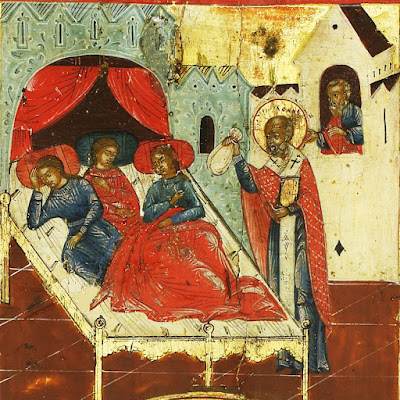JOSEPH LEARNS TO ACCEPT HER
“Now the birth of Jesus Christ was as follows: After His mother Mary was betrothed to Joseph, before they came together, she was found with child of the Holy Spirit. Then Joseph her husband, being a just man, and not wanting to make her a public example, was minded to put her away secretly. But while he thought about these things, behold, an angel of the Lord appeared to him in a dream, saying, ‘Joseph, son of David, do not be afraid to take to you Mary your wife, for that which is conceived in her is of the Holy Spirit. And she will bring forth a Son, and you shall call His name Jesus, for He will save His people from their sins…” (Mt 1:18-22)
On this second day of the Forefeast of Christmas (NC), I’m thinking how very human this family drama was. These two people, Joseph and young Mary, barely knew each other, so their drama played out in silence. When the very awkward situation developed that her pregnancy began to show, Joseph dealt silently with his fears. Apparently, she also did not say anything. And here an angel stepped in, one of the invisible good guys.
Does this make the story un-relatable for us, ordinary people? I think it’s relatable and holds a practical lesson for us, for those sticky moments in our own male-female interactions, when we fear rejection or betrayal but don’t know what to say or do. The lesson is that Joseph did not become angry in his silent fears and had compassion for his betrothed, which is why he was open to the voice of one of the invisible good guys. It nudged him in the right direction, saying, “Do not be afraid.” After this, Joseph accepted her as she was and for who she was; a woman with a vocation that came not from him but from God.
Thank God he didn’t send her away, because she needed him. Even she needed a man in her life, at that time. Just like we need one another. I, for one, need both men and women in my life, and am sometimes fearful of not being able to rely on those God sends into my life. These fears are at times understandable, but – and here is the lesson I glean from the above-quoted story, – fear should not be allowed to turn into anger or resentment. Fear needs to be treated by its antidote, faith, and opened up to God, Who can and does enlighten us, as to how or if we should proceed in any given human relationship. By His grace, if I embrace a bit of patience and compassion with myself and others, I remain capable of obedience to the good guys, the good voices in our midst, both visible and invisible, which nudge us in the right direction. God, by the prayers of all Your saints, help us not act rashly or lose the relationships we are meant to foster, and that are meant to foster us.























